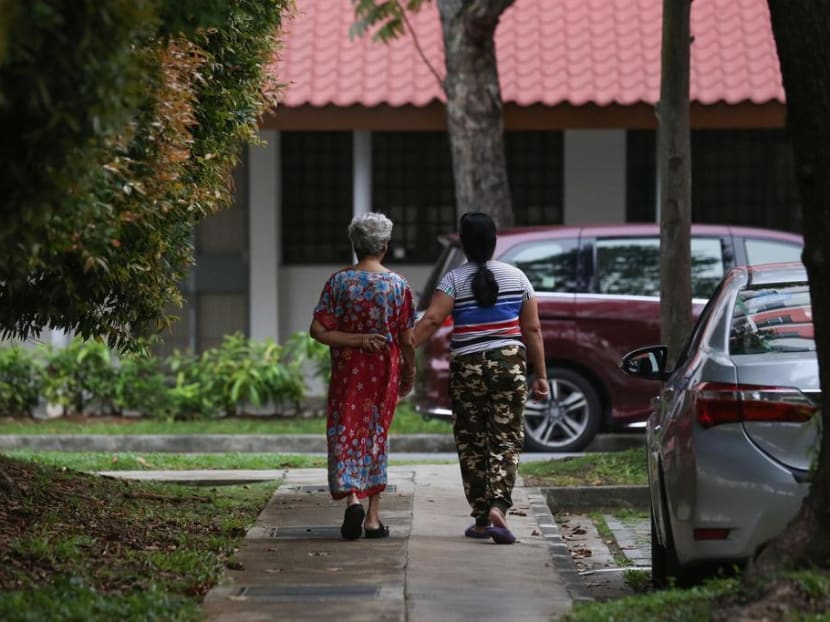Grandmother admits ordering 3 domestic workers to slap one another as punishment for poor work
SINGAPORE — Upset that her three domestic helpers were not carrying out their tasks to her satisfaction, a grandmother got them to slap one another on the face as punishment, and even had them pour water over one another until they were drenched.

The court heard that Kan Choi Yit was unhappy at the performance of three domestic helpers so she punished them by making them slap one another.
SINGAPORE — Upset that her three domestic workers were not carrying out their tasks to her satisfaction, a grandmother got them to slap one another on the face as punishment, and even had them pour water over one another until they were drenched.
On Thursday (March 12), Kan Choi Yit, 62, pleaded guilty to two charges of instigating the domestic workers to voluntarily cause hurt to each other, and another charge of instigating them to intentionally use force to annoy each other.
Kan will be sentenced on March 31.
Deputy Public Prosecutor (DPP) Joseph Gwee, who sought a jail term of two months and one week, told the court that the offences came to light on Oct 1, 2018 in the course of an investigation by a Ministry of Manpower (MOM) officer over a separate incident. Details of that incident were not stated.
The court heard that the foreign domestic workers involved were two women directly employed by Kan: Filipino Annabel Timbol Reyes, now aged 26, and Indonesian Ratna Lestari, now aged 25.
A third woman, Ms Planta Renalyn Manaday, now 32, a Filipino, was employed by Kan’s daughter-in-law, but would spend Sunday to Friday at Kan’s house with her employer.
TOO MUCH RICE, WASHING THE CAR LATE
DPP Gwee said that the first of three incidents was on Aug 20, 2018.
Ms Reyes was preparing food for Kan’s grandchildren that day. Instead of using a measuring cup to measure a suitable amount of rice to be cooked, Ms Reyes poured the rice grains directly into the rice cooker.
Kan inspected the rice and concluded that there was far more rice than required and questioned both Ms Reyes and Ms Ratna about it.
Ms Ratna admitted to her employer that she had not taught her colleague to use the measuring cup.
Angered that this lapse resulted in rice going to waste, Kan ordered Ms Reyes to slap Ms Ratna on the face 10 times. DPP Gwee said that the helper did so because she was afraid of disobeying Kan.
In a second incident, also around August that year, Ms Manaday and Ms Ratna were both washing the family car at Kan’s home.
The gate was open and the family dog ran out of the house. Ms Manaday alerted Ms Ratna to the runaway pooch by shouting at her.
Kan heard the commotion, came out to investigate, and scolded the pair for washing the car late.
DPP Gwee said that Kan instructed Ms Manaday to slap Ms Ratna twice on the face.
The third incident was in September. The court heard that Kan wanted to drink hot water, but discovered that none was available because none of the flasks had been refilled. This made her angry.
She reprimanded all three helpers and asked what they thought would be an appropriate punishment.
When they did not reply, she instructed them to pour room temperature water over one another.
The women complied, taking turns to fill up a cooking pot before pouring it over one another.
‘NO RIGHT’ TO METE OUT PHYSICAL PUNISHMENT
In asking for a lighter sentence for Kan, defence lawyer Justin Chan said that his client would typically get her domestic workers to write out lines many times if they committed some error, as a reminder not to do it again.
These included phrases such as “I will not lie” or “I will not forget to boil water in the morning”.
“It is a pent-up issue… In the proper view, it was one of discipline, rather than maliciousness,” Mr Chan said.
He also said that there was no serious harm caused, and that his client might have experienced a momentary lapse of judgement that could have been caused by the stresses of being a caregiver.
Kan sometimes looked after up to seven grandchildren at her home, Mr Chan said.
He also added that none of the domestic workers had personally filed a complaint with the Ministry of Manpower about how they were treated.
However, DPP Gwee pointed out that this was victim-blaming and that as domestic workers, they are in a vulnerable position.
“There may have been many reasons for them not to report — whether it is the fact that they already paid large sums (of money) to their agents to come here and work or because they want to earn more money for their families.”
He added that even if Kan was frustrated, she had no right to escalate verbal reprimands to physical punishment.








